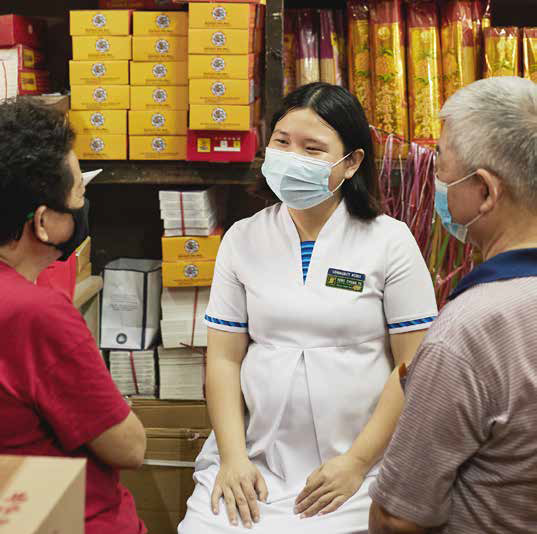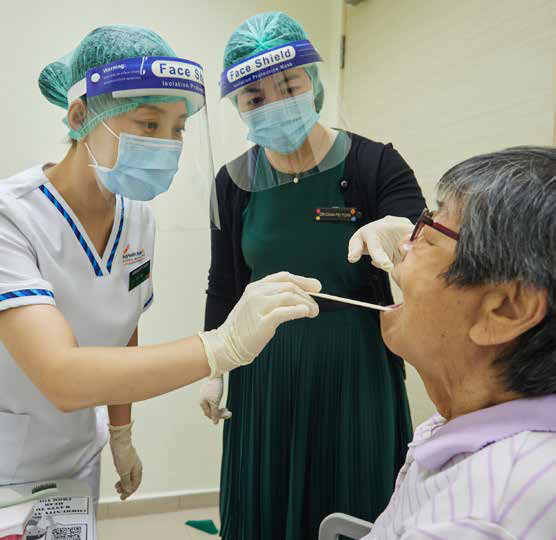As Singapore shifts its
healthcare focus from
disease treatment to
prevention, more new
community nursing
services have been
rolled out to residents in the south-east
region to help them age well and live
independently at home.
Singapore General Hospital (SGH)
Community Nurses, an increasingly
important group in population health
management, are stationed at 35
neighbourhood Community Nurse Posts (CNPs). The programme started in 2018,
with the nurses focusing on helping
the elderly with their chronic disease
management, including health assessment
and monitoring, medication selfmanagement,
and care referral.

“As part of the initiatives in supporting
seniors who are well or at pre-frail stage,
community nurses provide health coaching
in preventive health to empower
seniors to look after their own health,”
said Ms Cui Xue, Senior Staff Nurse,
Population Health and Integrated Care
Office (PHICO) – Community Nursing, SGH.
More recently, however, the roles of
community nurses have expanded and they
are supporting younger populations in
their 40s and 50s, as well as residents with
diseases requiring palliative and supportive
care, mental health and oral health support,
said Ms Nur Fadillah Ahmad, Senior Staff
Nurse, PHICO – Community Nursing, SGH.
Some of the new services available to
residents are Community Outpatient Antibiotic
Therapy (COPAT) and post-chemotherapy
granulocyte-colony stimulating factor (G-CSF)
injections for cancer patients. These are
treatments usually administered in hospitals
or outpatient clinics, so having them done
at home helps patients avoid hospitalisation
or incur other charges. “They also feel more
comfortable at home,” said Ms Cui.
Under COPAT, patients who are in
stable condition can undergo a course of
intravenous antibiotics treatment by a
community nurse at home instead of in the
hospital. These treatments last from days
to weeks. For G-CSF injections, patients
or caregivers are taught to perform the
injections competently. “We will go to their
homes to supervise and help them gain
greater confidence in injecting themselves,”
said Ms Cui, noting that if they are unable
to do so, they will need to go to the National Cancer Centre Singapore
(NCCS), private home
nursing services or nearby
clinics for the injections
24 hours after their chemotherapy.
The community nursing team
also collaborates with National Dental
Centre Singapore (NDCS) on an ongoing
pilot to conduct oral health screening and
education for seniors. The aim is for seniors
to have at least 20 natural teeth when
they reach 80 years of age.
“Poor oral health can lead to conditions
such as gum disease and tooth decay, both
of which can result in tooth loss if left
untreated. Extensive tooth loss can impair
a person’s chewing ability and may lead
to malnutrition in the long run, especially
in the elderly,” said Dr Chan Pei Yuan,
Consultant, Clinical - Restorative Dentistry,
NDCS, adding that oral health awareness is
still lacking in Singapore, with many people
visiting the dentist only when there is pain,
instead of the recommended six-monthly
preventive visits.

Forming a network with hospitals,
polyclinics and private clinics is also
essential if residents, in particular the
elderly, are to access healthcare resources easily. Community nursing already taps on
the resources of voluntary welfare agencies
like Thye Hua Kwan, NTUC Health and
Montfort Care, whose social workers
help residents who need financial and
social services.
Even as more schemes are being made
available, many are unaware or unfamiliar
with what they are and how community
nurses can help them. The first step is for
people to visit and register with their nearest
CNP or Active Ageing Centre (AAC). They
can then seek the help of these support
services when required.
“Moving forward, we will be moving
beyond care for the elderly population to
other populations with different care needs,”
said Ms Cui.
The good news is that this broad shift will
reach out to more people in the community
and improve healthcare accessibility.
Importantly, residents will be healthier and
less dependent on acute care resources.
With community nurses extending
their reach into maternal and child care in
future, these community services by both
the nurses and AACs will eventually become
a one-stop holistic healthcare service centre
for residents.
Get the latest updates about Singapore Health in your mailbox! Click here to subscribe.
